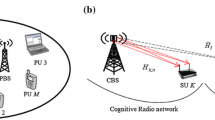Abstract
This paper is concerned with the resource allocation for multiple input multiple output and orthogonal frequency division multiplexing access (MIMO-OFDMA) downlink cognitive radio systems where a cognitive radio MIMO-OFDMA system is under spectrum sharing with an existing primary radio (PR) network. We use the channel learning scheme to estimate the channel information from cognitive radio transmitter (CR-TX) to PR and then make beamforming to transmit signal. Considering the interference from CR-TX to PR caused by the imperfect channel learning, we intend to maximize CR throughput under the interference power constraint at PR and CR transmit power constraint. A nearly optimal subcarrier and power allocation algorithm with linear complexity is proposed. The proposed algorithm is global optimal when the maximum transmit power is beyond certain threshold. Simulation results show that the proposed algorithm has a good performance very close to the global optimal algorithm.
Similar content being viewed by others
References
Goldsmith A, Jafar S A, Mari’c I, et al. Breaking spectrum gridlock with cognitive radios: an information theoretic perspective. P IEEE, 2009, 7: 894–914
Xing Y, Chetan N, Haleem M A, et al. Dynamic spectrum access with Qos and interference temperature constraints. IEEE Trans Mobile Comput, 2007, 6: 4420–4425
Bansal G, Hossain M J, Bhargava V K. Optimal and suboptimal power allocation schemes for OFDM-based cognitive radio systems. IEEE Trans Wirel Commun, 2008, 7: 4710–4718
Rui Z, Ying C L. Exploiting multi-antennas for opportunistic spectrum sharing in cognitive radio networks. IEEE J Sel Area Sig Proc, 2008, 2: 88–102
Shahraki H S, Mohamed-Pour K. Power allocation in multiple-input multiple-output orthogonal frequency division multiplexing-based cognitive radio networks. IET Commun, 2011, 5: 362–370
Rui Z, Fei G, Ying C L. Cognitive beamforming made practical: effective interference channel and learning-throughput tradeoff. IEEE Trans Commun, 2010, 58: 706–718
Rahulamathavan Y, Cumanan K, Lambotharan S. Optimal resource allocation techniques for MIMO-OFDMA based cognitive radio networks using integer linear programming. In: IEEE 11th Workshop on Signal Processing Advances in Wireless Communications 2010. Marrakech, 2010. 1–5
Abbasi-Jaunat A M, Zamiri-Jafarian H. Cooperative beamforming in MIMO-OFDMA cognitive radio systems. In: International Symposium on Telecommunications 2010. Tehran, 2010. 38–42
Abbasi-Jaunat A M, Zamiri-Jafarian H. Cooperative beamforming and power allocation in the downlink of MIMO cognitive radio systems. In: IEEE Vehicular Technology Conference. Ottawa, 2010. 1–5
Fei G, Rui Z, Ying C L, et al. Design of learning-based MIMO cognitive radio systems. IEEE Trans Veh Technol, 2010, 59: 1707–1720
Xu Z. Perturbation analysis for subspace decomposition with application in subspace-based algorithms. IEEE Trans Signal Proces, 2002, 51: 2820–2830
Xu Z. On the second-order statistics of the weighted sample covariance matrix. IEEE Trans Signal Proces, 2003, 51: 527–534
Cover T, Thomas J. Elements of Information Theory. New York: Wiley, 1991
Xin K, Ying C L, Nallanathan A, et al. Optimal power allocation for fading channels in cognitive radio networks: ergodic capacity and outage capacity. IEEE Trans Commun, 2009, 8: 940–950
Li G, Liu H. On the optimality of downlink OFDMA MIMO systems. In: Conference Record of the 38th Asilomar Conference on Signals, Systems and Computers. California, 2004. 324–328
Boyd S, Vandenberghe L. Convex Optimization. Cambridge: Cambridge University Press, 2004
Thomas H, Charles E, Ronald L, et al. Introduction to Algorithms. London: MIT Press, 2009
Author information
Authors and Affiliations
Corresponding author
Rights and permissions
About this article
Cite this article
Li, X., Gao, J., Liu, Y. et al. Resource allocation for MIMO-OFDMA downlink based cognitive radio systems with imperfect channel learning. Sci. China Inf. Sci. 56, 1–14 (2013). https://doi.org/10.1007/s11432-012-4672-x
Received:
Accepted:
Published:
Issue Date:
DOI: https://doi.org/10.1007/s11432-012-4672-x




